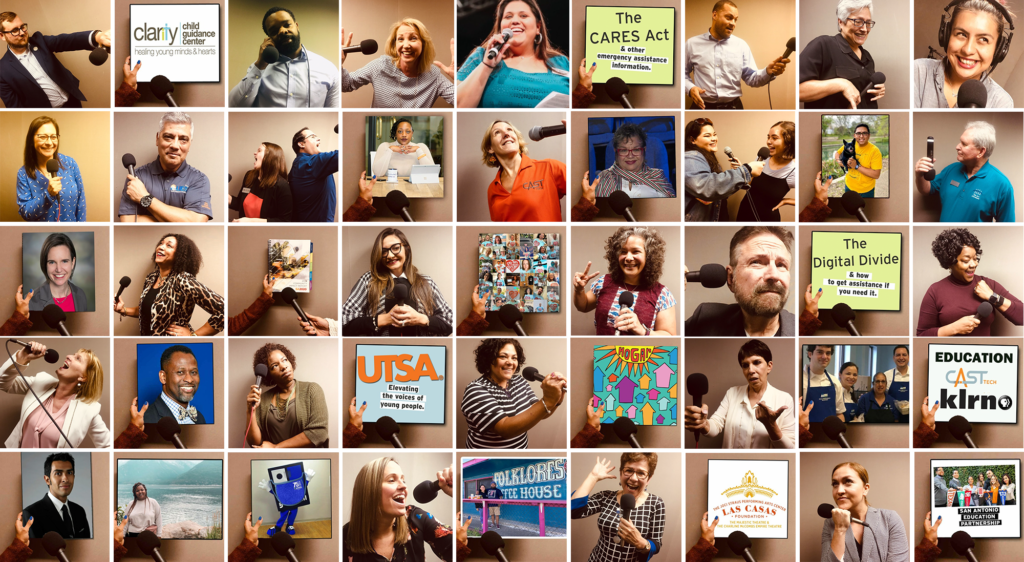In February 2019, SA2020 and KLRN partnered on a podcast to bring more complete stories of the San Antonians working to achieve shared goals. The Story Goes… celebrated our community’s collective successes, highlighted our shared challenges, and inspired listeners to take action.
Over the course of two years, The Story Goes…, co-hosted by Kiran Kaur Bains and Molly Cox and lovingly produced by Katrina Kehoe, told the stories of 45 San Antonians and their efforts to create change. Below, you can read more about calls to action they levied on our community. You can listen to the podcast on any subscription app or read the transcripts online. We thank CPS Energy for sponsoring The Story Goes… in 2020 and all the people who shared their stories and the stories of the people they serve.
1. Reflect on how you can make an impact, then jump in.
[Find] out what your gift is and what you could potentially give to a child or a student or another nonprofit. Maybe that’s a gift of time, a gift of talent, a gift of maybe resources, none of them are excluded from the opportunity to make a difference. – Jessica Weaver, Communities in Schools
Volunteer. Volunteer at the organization. Identify an organization that you see some value in—arts, domestic violence, agriculture—and spend time with that organization, address that one need. – James E. Cooper Jr., formerly with St. Philip’s College
Step one, I think, is to look inward. Where do you get excited about stories? Or about some sort of art? Where does it speak to you? Is it in the food that you’re going to go home and cook today? Is it going to the theater? Is it walking around downtown? Because art is everywhere, and the way to engage in it is really just up to you. – Nicole Amri, SAY Sí
Inform yourself about domestic violence. Learn about it. You’ve got to be in contact with your City Council and County Commissioners, making sure they know that if this is a priority for you. You have got to talk to your kids because this affects every generation, every group, every economic level, every education level, every faith community. You can contribute money. You can give us money and we will do the work. You can be part of the messaging. Something so basic as using violent words in your language. – Patricia Castillo, The P.E.A.C.E. Initiative
2. Be curious, ask questions, and work with others to help move the needle on complex community challenges.
Let’s come together in true community to bring forth the excellent innovations in access to the internet. We have the knowledge. We have the ability to partner. When we are talking about technology, we aren’t talking about technology for technology’s sake. We are talking about investments in human beings. That is what technology is about. It’s about creating an opportunity for all, and then the whole city benefits. – Jordana Barton, Digital Inclusion Alliance
Our ability to voice on our opinions doesn’t stop at voting, it is being involved in committees, as well as being vocal. – Christian Reed Ogba, EHCÜ PR
Those of us who are working with people who have quieter voices, we need to ensure that we are rallying those people, and that we are rallying ourselves to make our unified voice equally as loud as those other voices. – Dawn Dixon, Connect+Ability
3. Support young people.
Find somebody at your work, your household, your niece or nephew, like find somebody young and actually sit down and talk with them. Young people are innovating the way that we participate civically, not only in voting, but look at the way like you know, Direct Action is run, like Citizens To Be Heard is evolving. So, they do care about issues. They really care about things happening in their local community, and it’s a great time to connect with somebody in their local community and to have that conversation about what they care about. – H. Drew Galloway, MOVE Texas
It’s not about giving a voice to the youth because we recognize that young people have always had a voice, it’s just about creating those spaces. – Audrey Herrera, SA2020
Ask the kids! – Jeanne Russell, CAST Schools
From a parent perspective, I would say, talk to your kids often, know where they’re at, monitor their activities, in terms of who are they hanging out with…The usual stuff that they think,kind of, I’ve heard in the past. But also, something that you may not have thought of, is let them have their own reproductive health visit. – Evelyn Delgado, Healthy Futures of Texas
4. Recognize and grow in your leadership.
I would tell my younger self, you are good enough. What you think matters. Speak up more. Ask that question. Don’t be ashamed, and keep kicking butt. – Rachell Hathaway, Bank of America
I think it’s important for whoever is listening, when we are talking about leaders, we’re not just talking about elected officials and people in government…But that we all, we people, we citizens, we are the leaders of our society, and we can be the voices for what our counterparts and our neighbors need. – Shelby, Civic Leadership at UTSA
If I check in with myself, I know I can be a stronger leader… and I encourage others to do the same, wake up and check in with yourself to guide yourself through this thing. – David Nungaray, Bonham Academy & David’s Plantas
Be kind to yourself and be kind to others. – Jessica Knudsen, Clarity Child Guidance Center
[You don’t] have to be Bear Grylls out in the middle of the woods… get some sun. It can help you a lot. – Angelica Holmes, Black Outside

